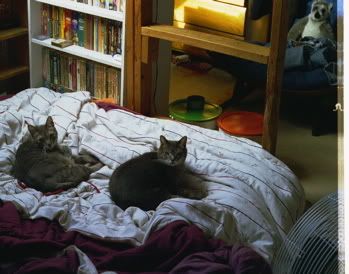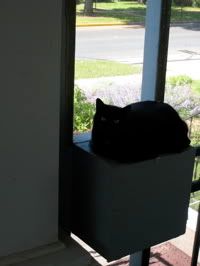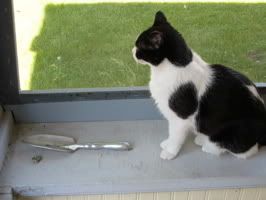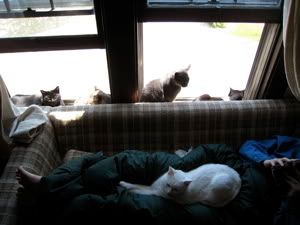(Cross-posted from a post I made in my blog over the weekend)
So this is how it works sometimes....
I have spent the last two nights working and reworking a conversation in Hawthorn Queen. All told, I have probably put down a couple thousand words easy, keeping maybe half of them. But none of them are the right words -- at least, not right now. They are good words, and there are some wonderful exchanges, but they...just...aren't...right.
That makes it harder. If it was all utter crap, I'd be able to delete it and take a different tack. But because they are good words, I keep trying to find ways to make what I have work with what I want. Hence, the couple thousand words lying on the page, but not really going anywhere in terms of story.
And then, as I am calling it a night and closing the windows, I have three lines of dialog come to me. Three lines. Less than twenty-five words in all. And they map out the entire conversation to its completion. And I run in here and slap them down in the middle of the draft so I can come back to them tomorrow when I am conscious and delete all the other words I have slaved over for the last two days and get on with it.
If I hadn't spent those two days picking up and putting down words, looking for the right combination, would I have found the ones I needed? Probably not. I'm a great believer in process, and sometimes process involves a lot of walking in metaphorical circles. So, yeah, it was worth it; but the thing is, you never know that when you are in the middle of it. Sometimes, you just end up with a jumble of words; sometimes, it is just a waste of time. Sometimes, my friend, you are simply wearing a hole in the metaphorical carpet. But you have no way of knowing which is which. And that's what makes it such a pain some days.
In case any of you were wondering how it works sometimes.
Monday, June 30, 2008
Friday, June 27, 2008
Friday Cat Blogging
Wednesday, June 25, 2008
Catch of the Day
Open Thread, What I Hate About My Process
This thread over at Nancy Pickard's blog got me thinking about all the little things about my writing process that drive me around the bend. Don't get me wrong, I love what I do, but sometimes how I do it crazy-making. Here's the one I mentioned over there:
The fact that the first third of a book takes me four times as long to write as the last third drives me crazy. Likewise the fact that I can write like a demon for three weeks and then have to sit still and do nothing for a month followed be three more weeks of demon but only a week break after that one and no idea what will be which this morning.
I'm not going to complain too much because my process got a whole lot faster about three years ago, but it still drives me to distraction that I don't have more control over it.
So, what about you, dear reader? What part of your process makes you want to tear your hair?
The fact that the first third of a book takes me four times as long to write as the last third drives me crazy. Likewise the fact that I can write like a demon for three weeks and then have to sit still and do nothing for a month followed be three more weeks of demon but only a week break after that one and no idea what will be which this morning.
I'm not going to complain too much because my process got a whole lot faster about three years ago, but it still drives me to distraction that I don't have more control over it.
So, what about you, dear reader? What part of your process makes you want to tear your hair?
Tuesday, June 24, 2008
What I Should Really Be Doing is Writing
But instead, I'm surfing the internet for news about the latest Marvel Comic movie (ooooh, rumors that Leonardo DiCaprio will star as Captain America....). Why? Well, I've been asking myself about that a lot, actually.
I think the answer is more than the typical answer (which is that I'm a profoundly lazy person,) but that this particular project -- a return to a universe I left several years ago -- means a lot to me. And, because I care so much, I'm having a hard time putting words to the page. My internal critic won't shut up, and my usual tricks to try to fool her into thinking that what I'm writing isn't REAL aren't working the way they usually do.
I have a lot of weird tricks I do to keep my internal editor from interfering. I keep my official novel in Courier, 12 pt, double spaced in a file labeled with the novel's name and a draft number, i.e, "resurrection code [1].doc." When I sit down to write, I open that file and re-read enough of it to get a sense of where I am in the story. Then I open a brand new file and write new stuff in Georgia, 12 pt, single spaced. See, that way I can tell myself that I'm not adding to the REAL novel. This is just draft writing, you see. Of course, usually at the end of my writing session, I end up cutting and pasting the whole thing without a lot of changes. Still, this works to fool my internal editor because, for some reason, I'm much more willing to trash a scrap done in non-manuscript format.
But, that's not working right now... well, not entirely. I'm writing, but slowly. I keep going over what I've previously written and picking at it, perfecting it....
What do you do to try to silence your internal editor? Any tricks you want to pass on to me?
I think the answer is more than the typical answer (which is that I'm a profoundly lazy person,) but that this particular project -- a return to a universe I left several years ago -- means a lot to me. And, because I care so much, I'm having a hard time putting words to the page. My internal critic won't shut up, and my usual tricks to try to fool her into thinking that what I'm writing isn't REAL aren't working the way they usually do.
I have a lot of weird tricks I do to keep my internal editor from interfering. I keep my official novel in Courier, 12 pt, double spaced in a file labeled with the novel's name and a draft number, i.e, "resurrection code [1].doc." When I sit down to write, I open that file and re-read enough of it to get a sense of where I am in the story. Then I open a brand new file and write new stuff in Georgia, 12 pt, single spaced. See, that way I can tell myself that I'm not adding to the REAL novel. This is just draft writing, you see. Of course, usually at the end of my writing session, I end up cutting and pasting the whole thing without a lot of changes. Still, this works to fool my internal editor because, for some reason, I'm much more willing to trash a scrap done in non-manuscript format.
But, that's not working right now... well, not entirely. I'm writing, but slowly. I keep going over what I've previously written and picking at it, perfecting it....
What do you do to try to silence your internal editor? Any tricks you want to pass on to me?
Monday, June 23, 2008
It's Monday, so...
You can find me blogging about my addiction to Internet research over at "Something Wicked..."
Sunday, June 22, 2008
Smart Things Past and Present
Steph Zvan saying smart things about breaking writing rules some weeks ago.
Also, Kimberly Frost saying smart things about hard things being good to do.
Also, Kimberly Frost saying smart things about hard things being good to do.
Saturday, June 21, 2008
'Cause everyone else is doin' it...Wordle
I haven't seen anyone else use Wordle for the evolution of series though. So...
WebMage:
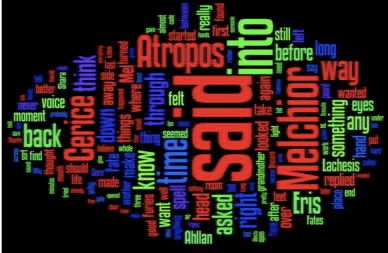
Cybermancy:
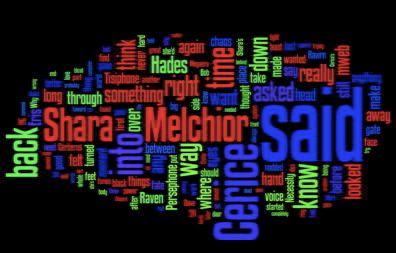
CodeSpell:
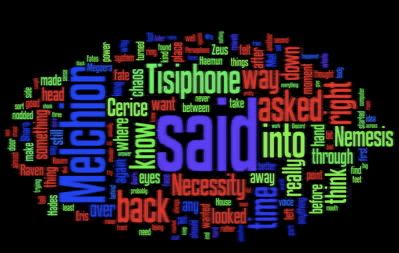
MythOS:
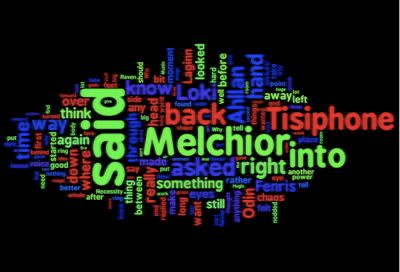
And, as a complete contrast, Black School:
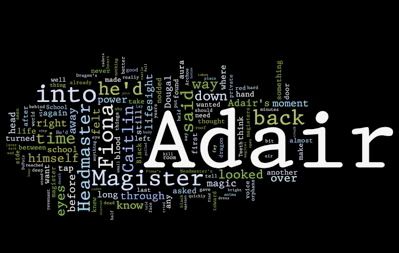
WebMage:

Cybermancy:

CodeSpell:

MythOS:

And, as a complete contrast, Black School:

Friday, June 20, 2008
Call for Contributors
Hey all,
I've posted a call for contributors over at my little side project, the Mighty Mighty MOC-BLOG.
Check it out, spread the word. Thanks!
Bill
I've posted a call for contributors over at my little side project, the Mighty Mighty MOC-BLOG.
Check it out, spread the word. Thanks!
Bill
Friday Cat Blogging
Thursday, June 19, 2008
Writers and Resistance
Below, Eleanor asks about writer resistance (to writing/finishing). I started to answer in comments than realized I had a lot to say on the subject.
My basic answer is that I think it varies from writer to writer and it's really 3 phenomena that can act individually or in concert.
1. I'm notism. As in, I'm not inspired. Or, I'm not having fun. Or, I'm not feeling about this piece like a feel when I'm really writing.
This is the one that I am most subject to, because most of the time when I'm writing I'm having a blast and feeling inspired. Except, sometimes I'm not because sometimes writing is really hard unpleasant work. So, I'm not feeling terribly inspired and like a ninny I wait for things to happen instead of making them happen. Then I remember that doesn't really work for me and I make things happen.
I'm notism is why I'm writing 2 books a year instead of 3 or 4. My actual writing time for a novel is between 2-1/2 and 4 months, while completion time is around 5-7 months because there's a lot of dead time in the process, sometimes weeks in a row.
2. Perfectionist control-freakism. In this case the writer isn't willing to finish the work because some portion of it isn't up to their current standards, and (A) damned if they're going to let anything go out the door that isn't exactly as it should be, and (B) they can damn well control the quality of their work at all times.
The problem with this one is that it is a falsehood rooted in the truth of the writer's experience. Most writers get better with age and practice. Experience plus improved craft tends to equal better writing. So, as you get older you see how much better a job you could have done on earlier work. This leads to hanging onto things longer and longer in hopes that you will figure out how to do it better, because you know you will.
But, if you don't let go of anything it never gets to readers who can teach you things, and you never sell anything which means you don't get to focus on your writing as much as you could if you were a high-selling professional, and you don't improve as much as you might if you would just learn to let go. And, even more than that, the way to grow is to always try to write so that you're reach exceeds your grasp. If you don't fail in little ways in a piece, it means you're probably not attempting something that's at the level you should be shooting for.
3. I suckism. This is the conviction that whatever piece your working on is awful and you hate it and no one will ever want to buy it and if you're foolish enough to send it out your agent, editor, readers, friends, family etc. will all decide the you are a fraud and should never have started writing in the first place.
In response you hide in a dark room and don't write because if you don't write it, it can't suck. Or, if you don't finish it, no one will ever see how much it sucks.
I personally don't really get this, though I often have the corollary I don't know if this makes senseism moments. Fortunately, those tend to be brief and can be solved by calling someone else, telling them what you're trying to do and seeing if it makes sense to them. With I suckism the only answer seems to be write it anyway, then find an audience who can read it and talk you down off the ledge.
So, what have I missed?
My basic answer is that I think it varies from writer to writer and it's really 3 phenomena that can act individually or in concert.
1. I'm notism. As in, I'm not inspired. Or, I'm not having fun. Or, I'm not feeling about this piece like a feel when I'm really writing.
This is the one that I am most subject to, because most of the time when I'm writing I'm having a blast and feeling inspired. Except, sometimes I'm not because sometimes writing is really hard unpleasant work. So, I'm not feeling terribly inspired and like a ninny I wait for things to happen instead of making them happen. Then I remember that doesn't really work for me and I make things happen.
I'm notism is why I'm writing 2 books a year instead of 3 or 4. My actual writing time for a novel is between 2-1/2 and 4 months, while completion time is around 5-7 months because there's a lot of dead time in the process, sometimes weeks in a row.
2. Perfectionist control-freakism. In this case the writer isn't willing to finish the work because some portion of it isn't up to their current standards, and (A) damned if they're going to let anything go out the door that isn't exactly as it should be, and (B) they can damn well control the quality of their work at all times.
The problem with this one is that it is a falsehood rooted in the truth of the writer's experience. Most writers get better with age and practice. Experience plus improved craft tends to equal better writing. So, as you get older you see how much better a job you could have done on earlier work. This leads to hanging onto things longer and longer in hopes that you will figure out how to do it better, because you know you will.
But, if you don't let go of anything it never gets to readers who can teach you things, and you never sell anything which means you don't get to focus on your writing as much as you could if you were a high-selling professional, and you don't improve as much as you might if you would just learn to let go. And, even more than that, the way to grow is to always try to write so that you're reach exceeds your grasp. If you don't fail in little ways in a piece, it means you're probably not attempting something that's at the level you should be shooting for.
3. I suckism. This is the conviction that whatever piece your working on is awful and you hate it and no one will ever want to buy it and if you're foolish enough to send it out your agent, editor, readers, friends, family etc. will all decide the you are a fraud and should never have started writing in the first place.
In response you hide in a dark room and don't write because if you don't write it, it can't suck. Or, if you don't finish it, no one will ever see how much it sucks.
I personally don't really get this, though I often have the corollary I don't know if this makes senseism moments. Fortunately, those tend to be brief and can be solved by calling someone else, telling them what you're trying to do and seeing if it makes sense to them. With I suckism the only answer seems to be write it anyway, then find an audience who can read it and talk you down off the ledge.
So, what have I missed?
DAYS WITHOUT INCIDENT: ZERO
In a pocket universe next door, Lyda is guest-blogging about The Incredible Hulk movie.
And if you don't done got enough Hulk after that, I'm especially fond of AdamACN's Hulk versus Abomination, Part 2.
I'm also amazed, just flat-out amazed, that a jingle writer thought to rhyme the line "pelted by gamma rays" with "ain't he unglamorous." It's my favorite thing, actually.
Thanks, Lyda! Wanna come back next week and rant about Secret Invasion?
And if you don't done got enough Hulk after that, I'm especially fond of AdamACN's Hulk versus Abomination, Part 2.
I'm also amazed, just flat-out amazed, that a jingle writer thought to rhyme the line "pelted by gamma rays" with "ain't he unglamorous." It's my favorite thing, actually.
Thanks, Lyda! Wanna come back next week and rant about Secret Invasion?
Wednesday, June 18, 2008
A Brief Question
I'm taking a new class at the Loft Literary Center. This one is on overcoming writer's resistance. If it works, you will see a flood of Arnason stories. I have eight at home -- almost finished, needing only a few hours of cleaning up. It would be nice to get eight stories out, not to mention three short story collections and the sequel to Ring of Swords. All this stuff is almost done.
What is resistance about?
What is resistance about?
Kelly Reading At Dreamhaven June 19th 7:00
Hi All,
I'm reading and signing at Dreamhaven Thursday June 19th. I'll probably read something from MythOS.
Kelly
I'm reading and signing at Dreamhaven Thursday June 19th. I'll probably read something from MythOS.
Kelly
Tuesday, June 17, 2008
Smart Things
To pull a page from Kelly's usual format:
Mindy Klasky is saying smart things to new writers about writing your second novel, and why it shouldn't be a sequel to your first, over on her blog. Check it out.
Mindy Klasky is saying smart things to new writers about writing your second novel, and why it shouldn't be a sequel to your first, over on her blog. Check it out.
Monday, June 16, 2008
Author Interview--Marie Brennan
What is Midnight Never Come?
In an nutshell, it's my Elizabethan faerie spy novel. To quote my own cover copy (which is the easiest way to answer at length):
Why Elizabeth/the Elizabethan period?
At a guess, I'd have to say my interest started with Shakespeare; I've always loved certain of his plays. (Surprise, surprise.) But it grew past that about ten or twelve years ago, when I read Shakespeare of London by Margaret Chute; that book approaches him as a working member of a theatre company rather than as a great literary genius, and it may have been my first introduction to the world of Renaissance London. I fell in love pretty fast. It's a fascinating period all over Europe, really -- ferocious religious tension and conflict, and yet despite that (or because of it?) such a vibrant time culturally. It offers the prospective author a lot to play with. And Elizabeth herself is interesting because even in her own time, they deliberately built her up as this iconic figure, as a means of legitimizing her rule as a Protestant and a woman on the throne. It explains a lot of her cult following even today. I'm not as much of an idolater as I used to be; these days, I've done enough research to recognize her flaws. But I still have a lot of respect for her, and for the people around her. There are a lot of great names from her reign: Walsingham, Burghley, Ralegh, Drake, Dee, Marlowe, Shakespeare, and so on. Plus, I like the clothes. Though I could do without the extremes of fashion: oversized cartwheel ruffs, enormously padded sleeves, and all the rest. Give me a streamlined Elizabethan look, thank you. (Which is more or less what I put the fae in.)
This novel grew out of that bugbear of fantasy, a role-playing game. What's up with that?
Some time ago, White Wolf published a game system called Changeling: The Dreaming, which is about playing faeries in the modern world. I ran a game of my own in that system during 2006, but it ended up being pretty non-standard, starting with the fact that it went through six hundred and fifty years of English history -- backward. (I called it "Memento," after the similarly-structured movie of the same name.) The Elizabethan segment of the game, originally set in 1589, grew like kudzu; it sprouted backstory starting in the mid-fourteenth century and repercussions going all the way to 2006, and more to the point, it wouldn't leave my mind. Specifically, Francis and Suspiria wouldn't leave my mind. So I did some narrative surgery, lifting that part of the story out of the broader context of Changeling and Memento, and reworked it as a novel. A few key points of the plot are drawn from the game, but since we had only three evening sessions in which to play it, I had to do a lot of expanding, and things don't happen exactly the way they did the first time. I also had to do some work to remove the Changeling-specific elements, but not as much as I expected; when you get right down to it, both the game designers and I were working from the same source, namely, real-world faerie lore. If you still see some similarity, that's why.
What kinds of media influences has this story had?
Shekar Kapur's movie Elizabeth left a strong imprint in my mind (and I'm delighted to see he's made a sequel). I recognize the liberties he's taken with history, but Cate Blanchett makes a fantastic Elizabeth, and Geoffrey Rush ain't bad as Walsingham, either. The Onyx Court owes a lot to that film; Kapur's vision is very rich and dark. I also think Invidiana's the conceptual daughter of Maleficent in Disney's Sleeping Beauty, though I'd written the whole novel before I noticed that. Music was a huge part of writing this book. Since I made "soundtracks" (i.e. mix CDs) for my game, I started off with some songs already chosen; I also made playlists for different moods -- the mortal court, the Onyx Court, confrontations, romantic/sad scenes (funny how those two go together), church scenes, and tavern/city scenes. Those were playing on shuffle while I wrote, and then in the end, for the first time ever, I went the extra step and made a "novel soundtrack." You can see the full listing on my website, and if you have a good film score collection, you can reconstruct most of it for yourself.
What can you tell us about your faerie research?
Without realizing it, I set myself a big challenge at the outset: keeping it English. Most of the faerie fantasy I've read, especially the modern urban fantasy, takes a globalizing approach, where a redcap and a kitsune and a leshy might all rub shoulders. That approach has a lot of fun potential, but for a story set in the sixteenth century, I decided I wanted to preserve regionalism as much as I could. Which turns out to be harder than you might think: many of the most famous bits of faerie lore (like the sidhe, or the Seelie and Unseelie Courts) turn out to be Irish or Scottish. If you strip those away, then the next biggest category is probably Welsh. Strip that away, and you find yourself looking at Cornwall and Yorkshire. We've got precious little surviving faerie lore from central and southern England. But although it's a lot of work, I'm glad I did it; my own setting felt more real to me because I could talk about continental fauns and muryans from Cornwall and redcaps along the Border, and how the Goodemeades are from the North originally, because that's where stories of brownies come from. I'm deeply indebted to the folklorist Katherine Briggs. Not only does she have two very useful books on general British faerie material (British Folk-Tales and Legends, and The Faeries in Tradition and Literature), she wrote one called The Anatomy of Puck that's specifically about the lore of Shakespeare's time. I couldn't have asked for a better resource.
What about the historical research?
There was a lot of it. I ended up with nearly three shelves of the small bookcase in my office devoted to nothing more than the books I was using to write this novel. Biographies, books about London, some literature from the time period, architectural histories . . . the list seemed endless. Like an optimistic fool, I believed at first that a time would come when I would say "okay, that's it for the research" and be done. God only knows where I got that idea; maybe my subconscious was in denial. Research never ends. There's always two or three more books that will be the last, you swear. I think I was reading William Tighe's dissertation on the Gentlemen Pensioners while I was in revisions. But the good news is, it's fun. I can't remember I came across this line, but someone once said history was a cross between a celebrity tabloid and a disaster movie; I love that description. The further I got into the biographies, the more people came to life, with all kinds of quirks and warts and behaviors that make you think, humans haven't fundamentally changed. The surface details, sure, but where it really counts, they're not so different from us. So I guess what I would say is, it's a tremendous amount of work, but the payoff is worth it. As long as you enjoy history, anyway, and if you don't, what are you doing writing a historical novel? There are easier ways to go crazy.
How was writing this book different from others?
Not since the first novel I wrote (which was not Doppelganger) has a project eaten my head so thoroughly. Part of it, I'm sure, was the necessity of research; when I wasn't writing, I was eyeball-deep in nonfiction. I've done spot research before -- reading up on poisons for Warrior and Witch, for example -- but never on anything like this scale, because I was never representing a real time period and place before. But I think it was more than that. Like I said above, certain key events in the plot came from the game Memento. That served as a kind of outline for me, and normally, I'm not an outlining kind of writer. Between that and my own growth in the craft, I found myself going through this book less asking myself, "how is this going to get resolved?" and more "how can I make the resolution of this more awesome?" Add in the richness of the history and backstory, and the greater number of pieces on my mental chessboard . . . you get the idea. Pretty much every aspect of this book, down to the words I used to tell it, really challenged me. And you don't meet a challenge firing on only half of your cylinders. I said in a post on my journal that this was the fourteen-year-old boy of books: it ate everything I fed it and demanded more.
Would you write a historical fantasy again? If so, what time period?
If anybody had asked me right after I finished the draft, I would have screamed "HELL NO" and dived for cover under the bed. But people were smart and didn't ask me. Now I'm about ten thousand words into what I call a stand-alone sequel to Midnight Never Come, set during the seventeenth century and titled And Ashes Lie. This may become an extended series, with novels placed at different points in English history; all of them will be independent enough stories that you don't have to read them in order, but of course the faerie court of London will be a unifying thread to link them all.
In an nutshell, it's my Elizabethan faerie spy novel. To quote my own cover copy (which is the easiest way to answer at length):
England flourishes under the hand of its Virgin Queen: Elizabeth, Gloriana, last and most powerful of the Tudor monarchs.
But a great light casts a great shadow.
In hidden catacombs beneath London, a second Queen holds court: Invidiana, ruler of faerie England, and a dark mirror to the glory above. In the thirty years since Elizabeth ascended her throne, fae and mortal politics have become inextricably entwined, in secret alliances and ruthless betrayals whose existence is suspected only by a few.
Two courtiers, both struggling for royal favor, are about to uncover the secrets that lie behind these two thrones. When the faerie lady Lune is sent to monitor and manipulate Elizabeth's spymaster, Walsingham, her path crosses that of Michael Deven, a mortal gentleman and agent of Walsingham's. His discovery of the "hidden player" in English politics will test Lune's loyalty and Deven's courage alike. Will she betray her Queen for the sake of a world that is not hers? And can he survive in the alien and Machiavellian world of the fae? For only together will they be able to find the source of Invidiana's power -- find it, and break it . . . .
Why Elizabeth/the Elizabethan period?
At a guess, I'd have to say my interest started with Shakespeare; I've always loved certain of his plays. (Surprise, surprise.) But it grew past that about ten or twelve years ago, when I read Shakespeare of London by Margaret Chute; that book approaches him as a working member of a theatre company rather than as a great literary genius, and it may have been my first introduction to the world of Renaissance London. I fell in love pretty fast. It's a fascinating period all over Europe, really -- ferocious religious tension and conflict, and yet despite that (or because of it?) such a vibrant time culturally. It offers the prospective author a lot to play with. And Elizabeth herself is interesting because even in her own time, they deliberately built her up as this iconic figure, as a means of legitimizing her rule as a Protestant and a woman on the throne. It explains a lot of her cult following even today. I'm not as much of an idolater as I used to be; these days, I've done enough research to recognize her flaws. But I still have a lot of respect for her, and for the people around her. There are a lot of great names from her reign: Walsingham, Burghley, Ralegh, Drake, Dee, Marlowe, Shakespeare, and so on. Plus, I like the clothes. Though I could do without the extremes of fashion: oversized cartwheel ruffs, enormously padded sleeves, and all the rest. Give me a streamlined Elizabethan look, thank you. (Which is more or less what I put the fae in.)
This novel grew out of that bugbear of fantasy, a role-playing game. What's up with that?
Some time ago, White Wolf published a game system called Changeling: The Dreaming, which is about playing faeries in the modern world. I ran a game of my own in that system during 2006, but it ended up being pretty non-standard, starting with the fact that it went through six hundred and fifty years of English history -- backward. (I called it "Memento," after the similarly-structured movie of the same name.) The Elizabethan segment of the game, originally set in 1589, grew like kudzu; it sprouted backstory starting in the mid-fourteenth century and repercussions going all the way to 2006, and more to the point, it wouldn't leave my mind. Specifically, Francis and Suspiria wouldn't leave my mind. So I did some narrative surgery, lifting that part of the story out of the broader context of Changeling and Memento, and reworked it as a novel. A few key points of the plot are drawn from the game, but since we had only three evening sessions in which to play it, I had to do a lot of expanding, and things don't happen exactly the way they did the first time. I also had to do some work to remove the Changeling-specific elements, but not as much as I expected; when you get right down to it, both the game designers and I were working from the same source, namely, real-world faerie lore. If you still see some similarity, that's why.
What kinds of media influences has this story had?
Shekar Kapur's movie Elizabeth left a strong imprint in my mind (and I'm delighted to see he's made a sequel). I recognize the liberties he's taken with history, but Cate Blanchett makes a fantastic Elizabeth, and Geoffrey Rush ain't bad as Walsingham, either. The Onyx Court owes a lot to that film; Kapur's vision is very rich and dark. I also think Invidiana's the conceptual daughter of Maleficent in Disney's Sleeping Beauty, though I'd written the whole novel before I noticed that. Music was a huge part of writing this book. Since I made "soundtracks" (i.e. mix CDs) for my game, I started off with some songs already chosen; I also made playlists for different moods -- the mortal court, the Onyx Court, confrontations, romantic/sad scenes (funny how those two go together), church scenes, and tavern/city scenes. Those were playing on shuffle while I wrote, and then in the end, for the first time ever, I went the extra step and made a "novel soundtrack." You can see the full listing on my website, and if you have a good film score collection, you can reconstruct most of it for yourself.
What can you tell us about your faerie research?
Without realizing it, I set myself a big challenge at the outset: keeping it English. Most of the faerie fantasy I've read, especially the modern urban fantasy, takes a globalizing approach, where a redcap and a kitsune and a leshy might all rub shoulders. That approach has a lot of fun potential, but for a story set in the sixteenth century, I decided I wanted to preserve regionalism as much as I could. Which turns out to be harder than you might think: many of the most famous bits of faerie lore (like the sidhe, or the Seelie and Unseelie Courts) turn out to be Irish or Scottish. If you strip those away, then the next biggest category is probably Welsh. Strip that away, and you find yourself looking at Cornwall and Yorkshire. We've got precious little surviving faerie lore from central and southern England. But although it's a lot of work, I'm glad I did it; my own setting felt more real to me because I could talk about continental fauns and muryans from Cornwall and redcaps along the Border, and how the Goodemeades are from the North originally, because that's where stories of brownies come from. I'm deeply indebted to the folklorist Katherine Briggs. Not only does she have two very useful books on general British faerie material (British Folk-Tales and Legends, and The Faeries in Tradition and Literature), she wrote one called The Anatomy of Puck that's specifically about the lore of Shakespeare's time. I couldn't have asked for a better resource.
What about the historical research?
There was a lot of it. I ended up with nearly three shelves of the small bookcase in my office devoted to nothing more than the books I was using to write this novel. Biographies, books about London, some literature from the time period, architectural histories . . . the list seemed endless. Like an optimistic fool, I believed at first that a time would come when I would say "okay, that's it for the research" and be done. God only knows where I got that idea; maybe my subconscious was in denial. Research never ends. There's always two or three more books that will be the last, you swear. I think I was reading William Tighe's dissertation on the Gentlemen Pensioners while I was in revisions. But the good news is, it's fun. I can't remember I came across this line, but someone once said history was a cross between a celebrity tabloid and a disaster movie; I love that description. The further I got into the biographies, the more people came to life, with all kinds of quirks and warts and behaviors that make you think, humans haven't fundamentally changed. The surface details, sure, but where it really counts, they're not so different from us. So I guess what I would say is, it's a tremendous amount of work, but the payoff is worth it. As long as you enjoy history, anyway, and if you don't, what are you doing writing a historical novel? There are easier ways to go crazy.
How was writing this book different from others?
Not since the first novel I wrote (which was not Doppelganger) has a project eaten my head so thoroughly. Part of it, I'm sure, was the necessity of research; when I wasn't writing, I was eyeball-deep in nonfiction. I've done spot research before -- reading up on poisons for Warrior and Witch, for example -- but never on anything like this scale, because I was never representing a real time period and place before. But I think it was more than that. Like I said above, certain key events in the plot came from the game Memento. That served as a kind of outline for me, and normally, I'm not an outlining kind of writer. Between that and my own growth in the craft, I found myself going through this book less asking myself, "how is this going to get resolved?" and more "how can I make the resolution of this more awesome?" Add in the richness of the history and backstory, and the greater number of pieces on my mental chessboard . . . you get the idea. Pretty much every aspect of this book, down to the words I used to tell it, really challenged me. And you don't meet a challenge firing on only half of your cylinders. I said in a post on my journal that this was the fourteen-year-old boy of books: it ate everything I fed it and demanded more.
Would you write a historical fantasy again? If so, what time period?
If anybody had asked me right after I finished the draft, I would have screamed "HELL NO" and dived for cover under the bed. But people were smart and didn't ask me. Now I'm about ten thousand words into what I call a stand-alone sequel to Midnight Never Come, set during the seventeenth century and titled And Ashes Lie. This may become an extended series, with novels placed at different points in English history; all of them will be independent enough stories that you don't have to read them in order, but of course the faerie court of London will be a unifying thread to link them all.
Sunday, June 15, 2008
Funniest Video Ever
This is a segment from Whose Line Is It Anyway? that I first saw in a hotel in Florida in 2004 or thereabouts. Laura and I laughed until we cried, literally. I just stumbled on it again on youtube, and once again laughed until I cried.
Friday, June 13, 2008
Question
Patrick and I had dinner with Maureen McHugh at Wiscon. She said something which is staying with me. She said she didn't know what is currently happening with SF.
"Slipstream?" I offered.
"That was the 90s," she replied.
I thought about this. It's easy to come up with labels for decades in SF.
1930s -- The pulps and Doc Smith
1940s -- Campbell and Astounding
1950s -- H.L. Gold and Galaxy, Anthony Boucher and F&SF
1960s -- The New Wave
1970s -- The Women
1980s -- Cyberpunk
1990s -- New space opera, the British writers
All the labels are arbitrary. The 1980s had a fair number of long, slow eco-feminist novels by women, along with cyberpunk by new, mostly male writers: Always Coming Home, The Door into Ocean, A Woman of the Iron People among others.
I think of the 90s as new, improved space opera, much of it by British writers. Maureen thinks it's slipstream.
All the usual, traditional kinds of SF writing continued through the decades: hard SF, the techno-problem story. People are still writing and selling deal with the devil stories. Sub-genres die slowly, if at all. When we label decades, we're talking about what's new.
So the question is -- is something happening that Maureen and I aren't seeing? Is nothing happening? Is SF finally fuzzing into the mainstream, which is (at the same time) fuzzing into speculative fiction? Or is SF splitting in so many directions that we can no longer think of it as a single genre?
"Slipstream?" I offered.
"That was the 90s," she replied.
I thought about this. It's easy to come up with labels for decades in SF.
1930s -- The pulps and Doc Smith
1940s -- Campbell and Astounding
1950s -- H.L. Gold and Galaxy, Anthony Boucher and F&SF
1960s -- The New Wave
1970s -- The Women
1980s -- Cyberpunk
1990s -- New space opera, the British writers
All the labels are arbitrary. The 1980s had a fair number of long, slow eco-feminist novels by women, along with cyberpunk by new, mostly male writers: Always Coming Home, The Door into Ocean, A Woman of the Iron People among others.
I think of the 90s as new, improved space opera, much of it by British writers. Maureen thinks it's slipstream.
All the usual, traditional kinds of SF writing continued through the decades: hard SF, the techno-problem story. People are still writing and selling deal with the devil stories. Sub-genres die slowly, if at all. When we label decades, we're talking about what's new.
So the question is -- is something happening that Maureen and I aren't seeing? Is nothing happening? Is SF finally fuzzing into the mainstream, which is (at the same time) fuzzing into speculative fiction? Or is SF splitting in so many directions that we can no longer think of it as a single genre?
Smart Things--A Bunch
A lot of people were saying smart things on the intertubes yesterday.
Suricattus and Jay Lake on contracts.
Agent Kristin Nelson on putting together pitches and queries.
Justine Larbalestier on how to finish a novel.
Anybody see anything else especially smart on the net yesterday?
Suricattus and Jay Lake on contracts.
Agent Kristin Nelson on putting together pitches and queries.
Justine Larbalestier on how to finish a novel.
Anybody see anything else especially smart on the net yesterday?
Thursday, June 12, 2008
The Transatlantic Telectroscope!
One of the news items this morning over in my other universe reminded me of something out of Sean's post with the steampunk link awhile back.
Behold the amazing Transatlantic Telectroscope:

[From csmonitor.com]
Behold the amazing Transatlantic Telectroscope:

[From csmonitor.com]
Wednesday, June 11, 2008
Me, Blogging Elsewhere
At SFNovelists about the pace of publishing and being expected to coherently answer questions asked about something written 9 years and 8 books ago. I'm not sure if I make a lick of sense since I'd forgotten I was supposed to post and ended up going from idea directly to post without the usual intervening steps of thinking and multiple drafts. If you want to see what my unfiltered brain looks like, go have a look. Then come back and let me know if I made any sense.
Smart Things: Finding Your Voice
Elizabeth Bear is saying smart things today ina post about the importance of confidence and finding your narrative voice. I commented over there, but I want to post here as well about this. Because this is my issue du jour at the moment.
I think (wrongly, rightly?) that my writing has reached a point where I can effectively tell a story and have it flow, make logical sequence, reach a climax, and resolve. I can even toss around the odd turn of phrase.
However. I do not have a narrative voice yet. I can't seem to figure out what it is, from the inside out. I admire the voices that other writers employ, and how they change from one piece to another, but when it comes time to speak in one, I find that I don't have it. I feel dumb, tongue-tied.
And until I figure that bit out, I'm hovering just below breaking through. Which is why Bear's post was so useful.
What about you? What is your experience of narrative voice? Whose do you like, or admire? What struggles have you had in finding a voice of your own?
I think (wrongly, rightly?) that my writing has reached a point where I can effectively tell a story and have it flow, make logical sequence, reach a climax, and resolve. I can even toss around the odd turn of phrase.
However. I do not have a narrative voice yet. I can't seem to figure out what it is, from the inside out. I admire the voices that other writers employ, and how they change from one piece to another, but when it comes time to speak in one, I find that I don't have it. I feel dumb, tongue-tied.
And until I figure that bit out, I'm hovering just below breaking through. Which is why Bear's post was so useful.
What about you? What is your experience of narrative voice? Whose do you like, or admire? What struggles have you had in finding a voice of your own?
Murder on a Stick
This came through my romance writers group list, but I had to pass it on. If you've never been to the Minnesota State Fair, you won't get the joke because they'll put anything on a stick. see: Minnesota State Fair On a Stick
Call for Short Stories
The Minnesota Crime Wave, which has produced the acclaimed anthologies Silence of the Loons and Resort to Murder, is accepting short stories for a new crime anthology to be titled Murder on a Stick. The focus of the collection will be the Great Minnesota Get-Together: the annual State Fair.
Requirements:
Authors must reside in Minnesota.
Authors must have previously published a work of fiction, nonfiction, poetry, or drama.
Stories must incorporate the Minnesota State Fair in a significant way.
Stories must involve the commission of a murder.
Stories must be no more than 7,500 words in length.
Stories must include at least 5 of the following 10 clues or elements:
A pile of manure
A ticket stub with writing on it
A headless stuffed animal
A blue ribbon
A church dining hall
A blood-stained plastic sword
A polka band
A prize-winning pie
The sound of a barker
Mini-donuts
General Guidelines:
1. Three copies of the manuscript must be submitted in paper form, double spaced, using a standard 12 point font, such as Times New Roman or Courier, and should printed on one side of page only.
2. Each manuscript page should be numbered at the top and include the story title.
3. Manuscript must include a cover page containing author’s real name, address, phone number, email address, and approximate word count. Also include the story title, and a pen name, if using one.
4. At the middle of the first page of the story, type the title in all CAPS; double space twice, and begin the story.
5. Centered on a line at the end of the story, type END.
Deadline for submission is October 1, 2008.
Story copies must be submitted to:
The Minnesota Crime Wave
3090 Mildred Drive
Roseville MN 55113
Authors will be notified of acceptance by December 1, 2008.
Payment for stories will be $100, paid on acceptance.
The anthology is scheduled for release in August 2009.
Questions may be directed to The Minnesota Crime Wave at:
minnesotacrimewave@yahoo.com
These guidelines will also be posted on The Minnesota Crime Wave’s website:
www.minnesotacrimewave.org
Monday, June 09, 2008
R.I.P. Algis Budrys
He went this morning. I haven't spoken to him in years, but I'll miss him all the same. He was a grand old bear of a man and he took very good care of my class at Writers of the Future in 2001.
Bill's porch project (with apologies to KDM)
I've been building a porch, too, not as sturdy and fine-looking as Kelly's, I'm afraid, but I have high hopes that in the fullness of time it will flourish into a genuine geek paradise.
Take a look at my brand-new baby, TM3B, which is kind of a front porch for the MOC main site.
Sometime soon I'll be putting out a call for contributors, so if you or anyone you know has an interest in writing about comics 'n' stuff . . .

Gormuu wants to eat your brain!
Take a look at my brand-new baby, TM3B, which is kind of a front porch for the MOC main site.
Sometime soon I'll be putting out a call for contributors, so if you or anyone you know has an interest in writing about comics 'n' stuff . . .

In a Weird Place
I'm currently in a strange place in my writing. It's a place I've been before, but with some differences. Let me explain...
As I posted about before, I've just delivered DEAD IF I DO. Now, I'm patiently waiting for my editorial revision letter to arrive via email. It usually takes my editor anywhere from a couple of weeks to months to find the time to read and comment on the book. In the past, her comments have significantly changed the novel. I've re-written large sections, changed key things about characters, and even completely revamped ending under editorial guidance.
I have another book in the Garnetverse under contract that I could start, but, you see, I'm not entirely sure how the last book ends officially.
I've been here before, of course. In the past, I tended to go a little stir crazy while I waited. I'd start short stories (often never ending them, but that's mostly because I suck at the shorter form), and wander around the house talking to myself. Granted, I tend to talk to myself a lot even under normal circumstances, but this is different... more akin to what Kelly calls, "leaking weirdness."
Normally I'm loath to start anything big because my brain actually tends to be monogomous. I work best by sticking to one project at a time. (I also have to write chronologically. I'm not one of those writers who can easily skip ahead and go back and write transitions. Sometimes I wish I were. I think I'd write faster.) Anyway, this time I've decided to be poly-novel. I've started the science fiction novel my alternate personality is contracted for with a small press.
In one way, it's good. I'm talking to myself less. I'm focused. I have something to do, where I'd normally be twiddling my thumbs and causing trouble for my family by playing too many video games, reading comics, and otherwise being a bad influence. I've also been having fun doing some research for the book, which I haven't really gotten to do in this way since the last science fiction project nearly four years ago.
In another way, I'm nervous. The editorial letter could arrive any day now. What's it going to be like to have to switch gears and go back to the Garnetverse after having been AngeLINKed for days? Keep in mind that I've never tried to divide my attention between two novels before, so I'm nervous... I feel like I'm having an illicit affair with the other project. What if I ruin my ability to go back to the other? What if Garnet can't satify me like Mouse can?
I guess I'll have to find out....
As I posted about before, I've just delivered DEAD IF I DO. Now, I'm patiently waiting for my editorial revision letter to arrive via email. It usually takes my editor anywhere from a couple of weeks to months to find the time to read and comment on the book. In the past, her comments have significantly changed the novel. I've re-written large sections, changed key things about characters, and even completely revamped ending under editorial guidance.
I have another book in the Garnetverse under contract that I could start, but, you see, I'm not entirely sure how the last book ends officially.
I've been here before, of course. In the past, I tended to go a little stir crazy while I waited. I'd start short stories (often never ending them, but that's mostly because I suck at the shorter form), and wander around the house talking to myself. Granted, I tend to talk to myself a lot even under normal circumstances, but this is different... more akin to what Kelly calls, "leaking weirdness."
Normally I'm loath to start anything big because my brain actually tends to be monogomous. I work best by sticking to one project at a time. (I also have to write chronologically. I'm not one of those writers who can easily skip ahead and go back and write transitions. Sometimes I wish I were. I think I'd write faster.) Anyway, this time I've decided to be poly-novel. I've started the science fiction novel my alternate personality is contracted for with a small press.
In one way, it's good. I'm talking to myself less. I'm focused. I have something to do, where I'd normally be twiddling my thumbs and causing trouble for my family by playing too many video games, reading comics, and otherwise being a bad influence. I've also been having fun doing some research for the book, which I haven't really gotten to do in this way since the last science fiction project nearly four years ago.
In another way, I'm nervous. The editorial letter could arrive any day now. What's it going to be like to have to switch gears and go back to the Garnetverse after having been AngeLINKed for days? Keep in mind that I've never tried to divide my attention between two novels before, so I'm nervous... I feel like I'm having an illicit affair with the other project. What if I ruin my ability to go back to the other? What if Garnet can't satify me like Mouse can?
I guess I'll have to find out....
Sunday, June 08, 2008
The Porch Project
So, I promised photos of the porch project. It's not quite complete as the door frame area still needs painting. The front windows open in. Everything can be removed in about twenty minutes.Updated: to add kittehs.
Overview:

Front Door:

Three quarters:

Profile:

Looking Out:

Trim Detail:

4.5 Cats (1 is basically invisible in this shot):

Overview:

Front Door:

Three quarters:

Profile:

Looking Out:

Trim Detail:

4.5 Cats (1 is basically invisible in this shot):

Saturday, June 07, 2008
PhD in...Buffy?
I'm cross-posting this from LJ page because I figure readers here will be interested as well:
There is a three day conference on the academic and philosophical messages and implications of "Buffy the Vampire Slayer" this weekend at Henderson State University. Given the amount of academic/serious discssuion I see about Buffy at cons (especially at WisCon), this doesn't surprise me at all. If it were closer and I'd had more notice, I may have even stopped in to check it out. Pretty cool, IMO, and a hell of a tip of the hat to Joss Whedon.
The newspaper article that caught my attention is here. Conference web site is here. Enjoy!
There is a three day conference on the academic and philosophical messages and implications of "Buffy the Vampire Slayer" this weekend at Henderson State University. Given the amount of academic/serious discssuion I see about Buffy at cons (especially at WisCon), this doesn't surprise me at all. If it were closer and I'd had more notice, I may have even stopped in to check it out. Pretty cool, IMO, and a hell of a tip of the hat to Joss Whedon.
The newspaper article that caught my attention is here. Conference web site is here. Enjoy!
Friday, June 06, 2008
Myspace WebMage Giveaway
So, it just occurred to me that some of y'all might want to wander over to Maria Snyder's blog where she's having a contest to give away three signed copies of WebMage. It's attached to a copy of the CodeSpell interview I did for SFNovelists that got posted here a while back. The books will go to:
1)Commenter chosen at random.
2)The person who asks me the best question as judged by Maria. I'm answering as they come in and I notice them.
3)The person who comes up with the best codespell.
Come on over.
1)Commenter chosen at random.
2)The person who asks me the best question as judged by Maria. I'm answering as they come in and I notice them.
3)The person who comes up with the best codespell.
Come on over.
Thursday, June 05, 2008
There's Realism, and then there's...
http://gadgets.boingboing.net/2008/05/14/real-stalker-cosplay.html. As the article begins...
"The outward limits on fandom tightly border total insanity. A squadron of Russian gamers, clad in gas masks, army fatigues and melted mutant rubber masks, bribed Russian officials to take them deep into the mutagenic wasteland of Chernbobyl's Zone of Alienation and cosplay a real-life version of the sci-fi PC game S.T.A.L.K.E.R.: Shadow of Chernobyl."
Monday, June 02, 2008
Head Full of World
I was chatting with my friend Jody and Neil Gaiman a while back and Jody made a comment about finding it hard to imagine what it was like to walk around with the whole world of a book in your head. Neil's response was very smart, as they generally are, and immediate and had to do with the ebb and flow of a book over the course of writing it. Since the conversation had moved on by the time a good response occurred to me, I didn't get to bring it out see what happened, so I'm going to do it here.
I find it difficult to imagine what it's like not walking around with the whole world of a book in my head. From my earliest days I've built elaborate worlds in my imagination. Generally, I've had at least several floating around in there of my own design plus a bunch that belong to other people. They may not all be at the forefront at any given time, but it only takes a moment for me to put myself in Middle Earth or on Pern or in Lankhmar.
Now, there is some qualitative difference in my understanding of the inner world of Aragorn and the inner world of Ravirn since I've got a lot more experience placing Ravirn in unfamiliar situations, but in many ways the experience of being a novelist and being a fan have a lot in common experientially, or at least they do for me. Stepping out of this world and into one of fiction, mine or someone else's is pretty much second nature for me.
What do you folks think? If you're a writer, do you find there's a big difference between having someone else's world in your head and having one of your own? Does one seem to fill your brain more? Is there a cognitive difference in terms of creative brain space vs. consuming brain space? If you're not a writer, how do you experience a fictional world? Is it a place you wholly contain in mind, or is it very much a place that you access through the gateway of a book? Any and all thoughts on the matter are welcome. I find the topic fascinating, especially since I'm a world-driven writer.
I find it difficult to imagine what it's like not walking around with the whole world of a book in my head. From my earliest days I've built elaborate worlds in my imagination. Generally, I've had at least several floating around in there of my own design plus a bunch that belong to other people. They may not all be at the forefront at any given time, but it only takes a moment for me to put myself in Middle Earth or on Pern or in Lankhmar.
Now, there is some qualitative difference in my understanding of the inner world of Aragorn and the inner world of Ravirn since I've got a lot more experience placing Ravirn in unfamiliar situations, but in many ways the experience of being a novelist and being a fan have a lot in common experientially, or at least they do for me. Stepping out of this world and into one of fiction, mine or someone else's is pretty much second nature for me.
What do you folks think? If you're a writer, do you find there's a big difference between having someone else's world in your head and having one of your own? Does one seem to fill your brain more? Is there a cognitive difference in terms of creative brain space vs. consuming brain space? If you're not a writer, how do you experience a fictional world? Is it a place you wholly contain in mind, or is it very much a place that you access through the gateway of a book? Any and all thoughts on the matter are welcome. I find the topic fascinating, especially since I'm a world-driven writer.
In German!
Subscribe to:
Comments (Atom)

